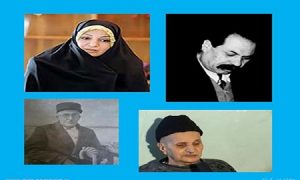The separation of some proficient Baha’i scholars and missionaries from the Baha’ism and working on its criticism is proof of its invalidity and emptiness. Because many of them left membership and even wrote works criticizing the Baha’ism, some of whom are introduced below:
- Abdolhossein Ayati Tafti
He was a virtuous literate in the guise of a clergyman who converted to the Baha’ism in 1319 AH (1940) in middle age and Abbas Affandi gave him the title of Avareh or a displaced person. He is the author of al-Kawakeb al-Dorriya, one of the most famous history books of the Baha’is. After converting to Islam, he considered the book to have no scientific validity and considered its writing to be under Baha’i pressure and biased. After returning to Islam, Ayati wrote the book “Kashf al-Hial” in criticizing the Baha’ism and published it in 1307 AH (1928). He also removed the title of Avareh from his name and died in 1332 AH (1953).
- Haj Mirza Hasan Nikoo
He split from the Baha’i Party concurrent with Ayati’s repentance, and by writing the book “Philosophy of Nikoo”, exposed the rootlessness of the Baha’i faith and the corruption and perverseness of its leaders. In four volumes of the Philosophy of Nikoo, Nikoo has logically criticized the history of Babism and Baha’ism and their texts. These 4 volumes, which is a rejection the Baha’ism, were published from 1306 to 1325 AH (1927 – ۱۹۴۶).
- Fazlollah Subhi
Fazlullah Mohtadi, better known as Subhi, was born in a Baha’i family and was a confidant of their secrets due to his distant kinship with Baha, About the last 10 years of Abbas Effendi’s life, became his scribe and lived in Haifa. In Haifa, he realized the hypocrisy and corruption of the Baha’i leaders and could not bear his presidency due to the severity of the evils he saw in Shawqi Effendi. Thus, he embraced the truth of Islam and became a Muslim in 1307 AH (1928) and spent the last 34 years of his life exposing the corruption of Shawghi Effendi and cultural services. In 1312 (1933), he was employed by the Ministry of Culture and in the same year, wrote the book “Memoirs of Subhi” and in 1335, the book “Father’s Message” in criticizing the Bahaism. In these two books, Subhi revealed the faces of its leaders. He was persecuted by the Baha’is for writing the books.
- Gholam Ali Goodarzi known as Adib Masoudi
He is a talented poet and a prominent literary figure who has been a disciple of Ayatollah Boroujerdi for some time. After 12 years of propagating Islam in the guise of a clergyman, he joined the Baha’ism and started propagating the cult from the age of 35, but from the year 1338 (1959), he became disillusioned with the Baha’ism due to his relationship with his faithful and serene father. The killing of his two sons and a daughter on the order of SAVAK hastened his return to Islam. Haifa House of Justice announced his spiritual rejection in 1355 (1976). After converting to Islam, Masoudi has composed excellent and eloquent poems in praise of the Imams of the Infallibles (PBUH) and the Imam Zaman (may God hasten his reappearance) and the demise of Imam Khomeini (God’s mercy upon his soul).
- Mirza Slaeh Eghtesad Maraghe’ie
After separating from the Bahaism, he wrote the book “Iqaz” or awakening, expressing the Baha’i anti-Islamic and anti-national betrayals. Mirza Saleh Eghtesad, who was the missionary and secretary of the Baha’is in Maragheh, published the book Awakening in discovering the betrayals of the Baha’is in 1307 (1928) in Tehran. It is worth mentioning that in the past, after the claim of prophecy by “Ali Mohammad Bab”, a large number of Babis in Maragheh at that time, converted to Islam.
- Masihollah Rahmani
For some time, he propagandized the Baha’i faith in Khorasan province, and after realizing its true nature, he publicly opposed the writing of the book “The Right Way in Refuting the Baha’i Basis and Exposing the Betrayals and Corruption of its Leaders.”
- Ghods Iran
She grew up in a Baha’i family, and her father, Abdul Karim Khayyat, was a Baha’i servant in Acre. She distanced herself from her father, mother and wife “Rahmatullah Alaei” and returned to Islam and wrote the book “Baraegheh Rahmat” or “Spark of Mercy” in critique of the Baha’ism.
- Aman Shafa
After separating from the Bahaism, he also wrote the book “A Letter from San Palo” exposing its true face.
- Mahnaz Rao’uffiha
She was born into a Baha’i family in the city of Sanandaj and as a result having contacts with Muslims and her comprehensive research, discovered the falseness of the cult and was rejected by Baha’ism administratively and spiritually, and despite her intense interest in her parents, she was forced to separate from them and has written several books criticizing the Baha’i s, the most important of which is the book “Shadow of the Night” published by the Kayhan Institute, which has been republished for ten times. This book was first published in 2006 and its tenth edition was published in 2010.
At the end of this discussion, it should be noted that many Baha’i missionaries, after encountering Muslim scholars and scientists, realized its invalidity, but did not repent due to worldly greed or fear of the Baha’ism encounter which can be referred to their names and biographies in the writings of Ayati, Nikoo, Subhi and… ».
https://mohtadyan.com/






